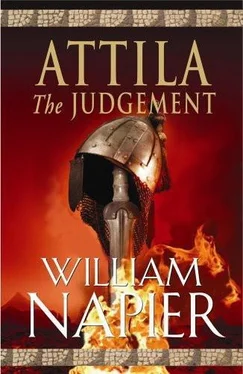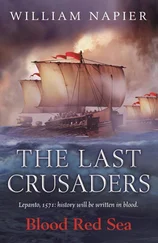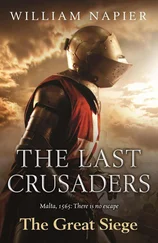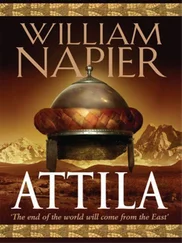William Napier - The Judgement
Здесь есть возможность читать онлайн «William Napier - The Judgement» весь текст электронной книги совершенно бесплатно (целиком полную версию без сокращений). В некоторых случаях можно слушать аудио, скачать через торрент в формате fb2 и присутствует краткое содержание. Жанр: Исторические приключения, на английском языке. Описание произведения, (предисловие) а так же отзывы посетителей доступны на портале библиотеки ЛибКат.
- Название:The Judgement
- Автор:
- Жанр:
- Год:неизвестен
- ISBN:нет данных
- Рейтинг книги:5 / 5. Голосов: 1
-
Избранное:Добавить в избранное
- Отзывы:
-
Ваша оценка:
- 100
- 1
- 2
- 3
- 4
- 5
The Judgement: краткое содержание, описание и аннотация
Предлагаем к чтению аннотацию, описание, краткое содержание или предисловие (зависит от того, что написал сам автор книги «The Judgement»). Если вы не нашли необходимую информацию о книге — напишите в комментариях, мы постараемся отыскать её.
The Judgement — читать онлайн бесплатно полную книгу (весь текст) целиком
Ниже представлен текст книги, разбитый по страницам. Система сохранения места последней прочитанной страницы, позволяет с удобством читать онлайн бесплатно книгу «The Judgement», без необходимости каждый раз заново искать на чём Вы остановились. Поставьте закладку, и сможете в любой момент перейти на страницу, на которой закончили чтение.
Интервал:
Закладка:
The easterner looked down at the fellow with the club. He was kneeling, stunned, with a second wound in his big shoulder, where an arrowhead was buried deep.
Arapovian called to him.
He looked up and grinned slowly. ‘Fuckin’ top of the world, my lissom Parsee comrade!’ Then he was back on his feet once more, laying his club on his shoulder, turning to face the onslaught yet again.
The Roman line curved and billowed, split apart and came togther again. Men fell forwards and backwards, screaming, clutching throats and chests. Many lay in the mud, dying, and many of those, even the most battle-hardened of the legions, ended their lives as they had begun: crying for their mothers. No medics came; they were all slain. None of their comrades came, either; they were all slain or fighting. The sun was sliding down the sky, and the field was mown flat like a harvest field.
Aetius crawled out from under his third fallen horse, helmet and sword both gone, and hauled himself up onto another sagging beast standing haggard, nuzzling bloody grass, desperate to eat but sickened. He stared around. His army was almost gone.
But across the field… the enemy army was thinning out. The flanks were receding. There was a huge concave bow near the centre, and the limitless depth that the horde had shown this morning, stretching back and back into the blue distance, had shrunk away. They were stretched thin and to breaking. Away in the east there was a dust-cloud burnished gold in the setting sun, so many were retreating.
Nearer, before that haze of dust, there was a gleaming serpent of armoured horsemen: the wolf-lords curving into the scattered flank of the Hun line yet again. They rolled it up. Before Aetius’ dust-blurred eyes, the Hun line folded in on itself, collapsed. The wolf-lords drove on, too tired to gallop now, only trotting, but with lances still lowered, implacable. The Huns broke and fled.
Night seemed to fall fast on that day. The sun had seen enough.
Aetius, too, had seen enough, but it was not over. His work was not done yet. Runners were too few. He must find more. He called for a wagon to be drawn up and piled with saddles and he climbed onto it. A filthy fellow passed beneath him, knelt, cleaned his sword in a rare patch of unsullied grass.
‘You, man,’ Aetius called to him. ‘Up here. Lend me your eyes.’
The fellow came up and stared north.
‘You,’ muttered Aetius.
‘I,’ said Arapovian. After a moment he said, ‘Here is an irony. Attila is piling up a wagonload of saddles like ours.’ He glanced at Aetius. ‘How emulous he is of you in all he does.’
‘What else?’
‘They’re drawing their remaining wagons into a circle, the oldest Hun tactic. But so many have fled that the circle is small. Why does he not retreat?’
‘Because he thinks we will fall on him by night and destroy him.’
‘We would if we had any men left.’
Arapovian was immediately sorry for his cruel joke. Aetius bowed his head and raised his hand to his eyes. Arapovian said softly, ‘But the battle is over.’
Aetius looked up again and out over the carnage field. ‘The battle is indeed over,’ he said. The note in his voice wrung the Armenian’s heart. ‘And both sides have lost.’
10
Attila knelt in the dust beside the dying man.
Orestes, standing behind him, said, ‘The body of the Lord Geukchu cannot be found, but he was seen fighting to the last before the Roman line. Noyan fell before the Visigothic horses.’
Attila barely reacted. His face was ashen-grey and deep-furrowed, his cheeks sunken, his eyes flat. He reached his strong hand under the fallen warrior and raised his head a little.
Chanat’s eyes fluttered. Blood continued to flow from the deep swordcut in his thigh, tight-bandaged though it was. He managed to lay his hand upon Attila’s arm. ‘Great Tanjou,’ he whispered.
Attila lowered his head and his straggling grey locks brushed the back of Chanat’s hand. ‘How far we have ridden together, old friend, first of my Chosen Men. That you were the first to meet me upon the plain of my homeland when I rode out of exile. That we rode against the Kutrigur Huns together, and forged our People into a mighty brotherhood. That Chanat the Chivalrous, the Merciful, made us turn back and fight for that forsaken village in the desert, for his great heart was greatly moved. None of this will be forgotten in the songs of the People, my brother Chanat, son of Lord Subotai, proud father of the warrior Aladar, who chose his death before the walls of Constantinople.’
Chanat’s hand tightened a little on Attila’s arm. Then he was gone.
After a few moments Attila rose, stripped to the waist and dropped his bone jerkin to the ground like a thing of trash. He poured a handful of dust over his grey locks, unsheathed his sword, unbuckled his scabbard-belt, slashed the scabbard away from the leather belt and let it drop into the dust. He buckled the belt back round his waist and thrust the naked sword through it. Then he looked around the crude wagon laager.
‘We die here,’ he said. ‘Beside our brother Chanat.’
King Theodoric’s bloodied and trampled body lay on a pyre of splintered timbers. His two sons kept vigil and wept. Some said that the King had been ridden down by the Huns, others that in the furious thick of the fight his own wolf-lords had trampled him. But that was all one now. Amalasuntha had been truly avenged. The Visigothic column, driving into the enemy again and again, had finally broken through to where the three sons of Genseric sat their white horses beneath the banner of the Black Boar, horrified to find that thousands of their own, finest Vandal horsemen had been unable to protect them. The three sons, Frideric, Euric and the idiot Godric, he who had been so briefly married to the Princess Alamasuntha, were roped up, dragged back to the Gothic lines and beheaded. Their heads would be salted and despatched to Genseric in a sack.
As he lay dying, Theodoric had whispered, ‘That is justice. That is Gothic justice for that tyrant among men. Now the spirit of my beloved fair-haired girl will sleep easy in the Courts of Heaven.’ Tears and blood mingled in his white beard. He closed his eyes, and his breathing slowed. Then he laid a great bloodstained hand on young Theodoric’s head. ‘This life is a sigh between two secrets, the sparrow’s flight through the mead-hall beset by night. But Gae? a Wyrd swa hio scel – Fate goes ever as fate must. You, my son, will be a great king of my people. Rule wisely and well, as befits a Visigoth. Torismond’ – he touched his head – ‘you will be a great servant of your brother, and a great man among men. The Lord bless you and keep you. Love your mother and care for her in her last years. As I have loved you, with all my heart.’ His hand slipped down, his head sank back and his breathing stilled.
Long after sunset the wolf-lords’ torches blazed for their dead King, and Aetius came and held a torch, too. They lamented Theodoric and lauded him.
‘Lord and lavisher of rings,
From his golden hoard, on the funeral road.
Bravely he bought them, hardily hoarded them,
Grimly he guarded them, against the eastern kings.
A Lord among men, high his renown,
Let pyre take him, fire enfold him,
Furled in the flames, our king of men!
Heavy our hearts with the mighty memory of him,
Silenced our laughter but fluent our tears,
No torcs will they wear now, our loveliest maidens,
Silver not shine on them, brooch not bedizen them,
Oft and repeatedly, in sad paths of exile,
Deeply will mourn for him, the people’s defender, Bereft they will walk, soft they will talk,
Читать дальшеИнтервал:
Закладка:
Похожие книги на «The Judgement»
Представляем Вашему вниманию похожие книги на «The Judgement» списком для выбора. Мы отобрали схожую по названию и смыслу литературу в надежде предоставить читателям больше вариантов отыскать новые, интересные, ещё непрочитанные произведения.
Обсуждение, отзывы о книге «The Judgement» и просто собственные мнения читателей. Оставьте ваши комментарии, напишите, что Вы думаете о произведении, его смысле или главных героях. Укажите что конкретно понравилось, а что нет, и почему Вы так считаете.












